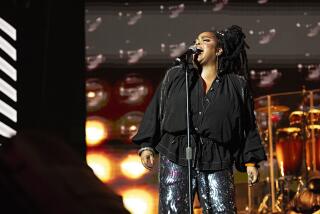NATIONAL ANTHEM : ‘O, Canada’ a Potent Symbol of Conflict
MONTREAL — In most countries, the national anthem is something a visitor may not want to look at too closely, filled as it is likely to be with war whoops, blood-spattered flags, swords, cannon, tombs and references to obscure revolutionary dates.
“The path to glory passes over the bodies of our foes,” trill the Vietnamese, while the Guatemalans worry lest “tyrants spit in (our) face.” Indignant Algerians complain that “When we spoke, nobody listened to us,” and Cambodians recall, as well they might, “The bright red blood . . . spilled over the towns and over the plain.”
And of course, no recitation of national hymns is complete without mention of “The Star-Spangled Banner,” a pyrotechnical extravaganza that invokes a war most Americans would be hard-pressed to sort out.
Canadians, by contrast, sing gentle, sensible lyrics about “our home and native land,” set to non-martial music. Their anthem, “O, Canada,” even reflects what ought to be a perfect fusion of the country’s double heritage: Some verses are in French, others in English.
But now, the Montreal Machine, Canada’s addition to the new World League of American Football, has banned all singing or playing of “O, Canada” at its games--the latest sign of how discordant the English-French relationship has become.
“There are a lot more problems than agreements over the national anthem,” says Machine spokesman Ray Lalonde. “We decided that to avoid violence of any sort, we would just stop playing it.”
Violence? Could Canadians be moved to violence by hearing, as they wave pompons and knock back beer, about “true patriot love,” about “spreading prairies” and “lordly rivers?”
After its season-opener last month against the Barcelona Dragons, the Machine reached the conclusion that, indeed, they could.
Team management had brought in jazz trumpeter Maynard Ferguson to play “O, Canada,” thinking an instrumental rendering would get around the sticky question of whether to have a vocalist sing the French or English lyrics. But that wasn’t enough to fool Montreal’s restive, Quebec-nationalist football fans.
No sooner had Ferguson played a few bars than a crescendo of boos, hisses and jeers surged from the crowd. Ferguson was “shocked,” says Lalonde, while the football players, most of whom happen to be apolitical, English-speaking Americans, “couldn’t figure out what was going on.” There were also angry shouts from Canadian loyalists, screaming at the Quebec nationalists.
Lalonde feared fistfights might break out. “It was a situation that was not very pretty,” he says. “We felt that it would just be better for us to focus on the sporting event, and take away the political flavor.”
Canada’s national anthem has become a potent symbol in a country uncertain about what the next two years will bring. A vaunted attempt at national reunification--the so-called Meech Lake Accord--flopped last year; this spring, a crucial policy-making body in Quebec called for a referendum on sovereignty by October, 1992.
While politicians have struggled with the issue, ordinary Canadians have complained that no one is listening to them and they have taken out their frustrations in various rude ways.
At Toronto’s Skydome, for instance, Blue Jays fans routinely break into catcalls when vocalists reach the French verses of “O, Canada.”
It is little wonder that the Quebecers booed when they saw their chance. Now Montrealers are watching to see whether the hometown baseball team, the National League Expos, will follow the Machine’s lead and ban the anthem, too. The Expos, like the Machine, play in Olympic Stadium, in the heart of Montreal’s working-class, Francophone East End. Observers say any sporting event there is likely to draw a rowdy, nationalistic crowd.
CANADA, O, CANADA
O, Canada! Our home and native land! True patriot love in all thy sons command. With glowing hearts we see thee rise, The True North strong and free; And stand on guard, O, Canada, We stand on guard for thee. O, Canada! Glorious and free! We stand on guard, We stand on guard for thee, O, Canada! We stand on guard for thee.
Music by C. Lavallee
Lyrics by Sir Adolphe Basile Routhier; English version by Stanley Weir
More to Read
Sign up for Essential California
The most important California stories and recommendations in your inbox every morning.
You may occasionally receive promotional content from the Los Angeles Times.










